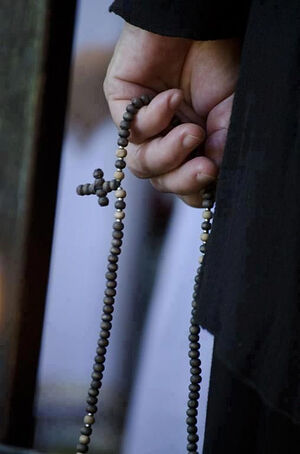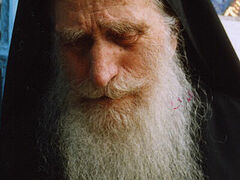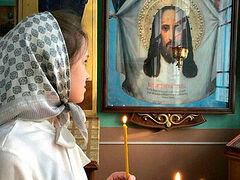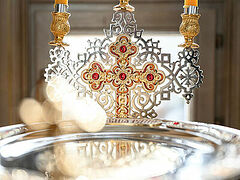 Photo: elitsy.ru What is most precious of all? The soul. What is most needed in this world? The salvation of the soul. What must be done to save the soul? Above all, we must pray to God to help us save our souls. Why is this so necessary? Because without God’s help, it’s impossible to save the soul. God’s help is given to those who ask for it. Therefore, whoever wants to save his soul must pray.
Photo: elitsy.ru What is most precious of all? The soul. What is most needed in this world? The salvation of the soul. What must be done to save the soul? Above all, we must pray to God to help us save our souls. Why is this so necessary? Because without God’s help, it’s impossible to save the soul. God’s help is given to those who ask for it. Therefore, whoever wants to save his soul must pray.
Which prayer is best to pray?
Every prayer is good if it’s said with understanding and zeal. It’s good to read all the prayers that you know, only read them unhurriedly, delving into every word to understand what it means.
What should someone do who doesn’t know any prayers, but desires to pray, to save his soul? Even if such a man were to be found who has never prayed, he probably still knows one prayer, from hearing it so often, even if he’s never prayed it himself. This prayer is so short that any forgetful person or small child could memorize it.
What prayer is it? It’s the prayer that you hear most often in church and at home. It consists of only three words: “Lord, have mercy.”
Who doesn’t know, who hasn’t heard this prayer? Both young and old—everyone knows it. Anyone can pray this prayer. It has few words but much content. It’s only three words, but you can pray to God for many things with it. This prayer is short, but you can pray it for a long time. Pay attention to how this prayer is said in church. Let the Church be our teacher in this matter. When the priest invites all present to prayer and reminds them what to pray for, then the people respond to his every invocation with just three words: “Lord, have mercy.” True, it’s not the people answering now, but just those standing on the kliros, but it’s basically the same. The kliros answers for everyone standing in the church. When the priest says: “For the peace from above, and the salvation of our souls, let us pray to the Lord,” the people answer: “Lord, have mercy.”
The priest says: “For the peace of the whole world, the good estate of the holy churches of God, and the union of all, let us pray to the Lord,” and the people respond: “Lord, have mercy.” Let us pray for the tsar [or president, etc.], the bishop and presbyters, for the authorities, for the army, for the cities, and for all the faithful, says the priest, and the people proclaim the same prayer. The same three words—“Lord, have mercy”—are pronounced when the priest invites the people to pray for those who are sailing, traveling, and those who are sick and suffering.
That means we can pray this prayer for everyone and everything. Also note that this prayer, “Lord, have mercy,” is sometimes said three times in a row, sometimes twelve, sometimes forty, and sometimes a hundred. Why? So that we might pray more fervently. If you say “Lord, have mercy” once, then you might not penetrate into the meaning of what was said. When you say the same words two or three times, you’re more likely to pay attention to what you’re saying—you’ll remember that you’re entreating the Lord. And when you say these words in three sets of three, or four sets of three, then you remember that you’re standing before the Lord, and at the same time, perhaps you’ll feel either joy or fear. And when you beg the Lord with such fear and joy, He’ll hear your supplication and have mercy on you.
In church, sometimes it’s indicated what we should pray for, as we’ve said (though sometimes it’s not mentioned), but we only say “Lord, have mercy” twelve or forty times. Why so? To give us the chance to pray for what we need. That’s what it means. Let’s say you especially need to pray for forgiveness for some sin. You hear “Lord, have mercy” repeated in church several times. Use this time to express your sin before God. You also say, “Lord, have mercy”—once, twice, three times, to strengthen your repentance and entreat forgiveness of your sins more fervently. Throughout the day, we transgress many times in deed, word, and thought. If we cry out with repentance for every sin: “Lord, have mercy,” then we’ll have to say this prayer many times. That’s why the Church appoints to say, “Lord, have mercy,” sometimes forty times.
Thus, we need this prayer to repent of our sins and entreat the Lord for forgiveness.
Some are experiencing sorrow of soul, another needs to pray for his pain, and another needs to entreat God’s help in some matter. So they are given the opportunity to bring their needs and petitions before the Lord, and all repeatedly say the same thing: “Lord, have mercy,” that is, “Do with us according to Thy mercy; show us Thy mercy, O Lord.”
As the Church teaches us to pray in church, so we should pray at home. Whatever you need, ask it of God with this prayer. When you stand before your holy icons in the morning, having arisen from sleep, or in the evening, before sleep, pray this prayer. Say: “Lord, have mercy”—unhurriedly, with attention; say it five, ten, forty, a hundred times. Put your petitions for all your needs into it.
For those who aren’t used to praying at home and rarely go to church, perhaps they don’t know what it’s necessary to pray for at first. Therefore, let’s say a few words about what we should pray for at home, in private.
First of all, pray for the salvation of your soul. Say: “Lord, have mercy,” and in your mind think, “Lord, save my soul; Lord, teach me how to be saved.” Say: “Lord, have mercy” ten times and more for the salvation of your soul. Then pray for the forgiveness of sins; remember how you have sinned now or sinned before, and say: “Lord, have mercy”—also ten or twenty times. Then pray for Paradise, so the Lord might not deprive you of His Heavenly Kingdom, and also say: “Lord, have mercy” ten times. Then pray for the Lord to deliver you from eternal torment. Remember how sinners suffer in hell and say: “Lord, have mercy, Lord, have mercy, Lord, have mercy,” and in your mind think: “Deliver me from these torments.” Cry out with this, “Lord, have mercy,” as if you’re already in hell, in flames, among sinners, and as if stretching forth your hands to God with the cry: “Lord, have mercy; Lord, lead me out of here.”
Then pray for the most pious Sovereign and his entire household, for the bishops and all the clergy; pray for your parents, for your spiritual father, for all your relatives, and say for each of them: “Lord, have mercy.”
Pray for your family; pray for the Lord to give you and your relatives health; pray for the Lord to help you in your affairs in general; and pray for the work that you want to do today. Also pray for all the deceased.
From what has been said, it can be understood that anyone can pray, not only the literate, but also the illiterate; those who know many prayers and those who know few can pray; you can teach little children to pray because “Lord, have mercy” can be said by a small child who has only just learned to pronounce the name of his father or mother.
From what’s been said, it’s also clear what we should pray for; it’s clear that above all we should pray for the salvation of our souls, for the forgiveness of sins, for Paradise, for deliverance from hell. Then pray for others, and finally for all our daily needs.






